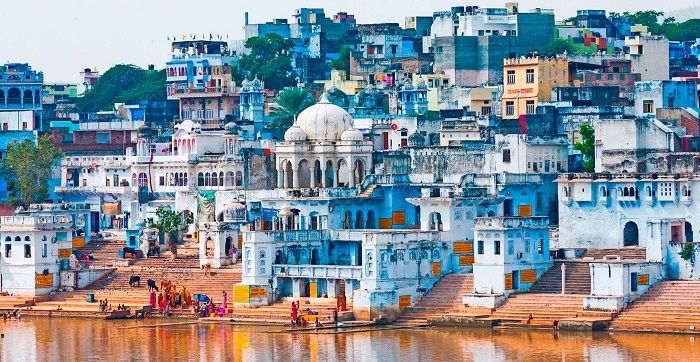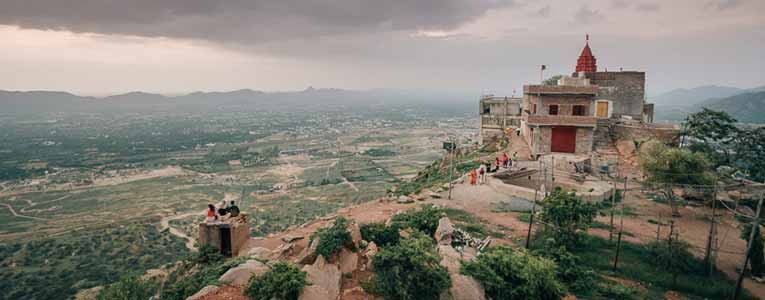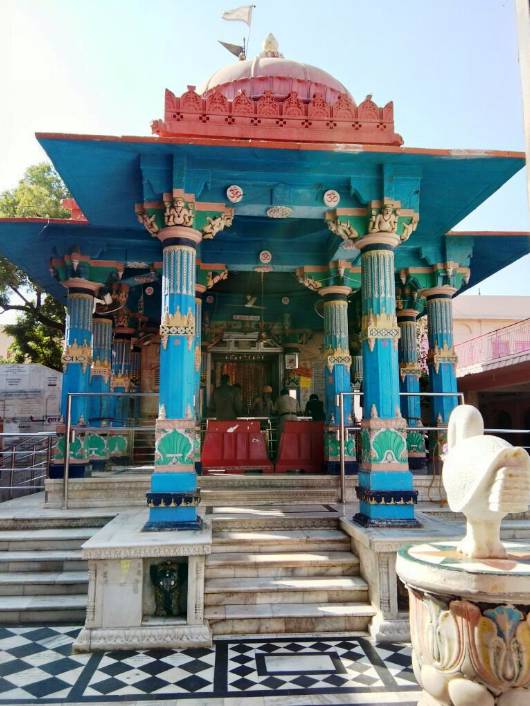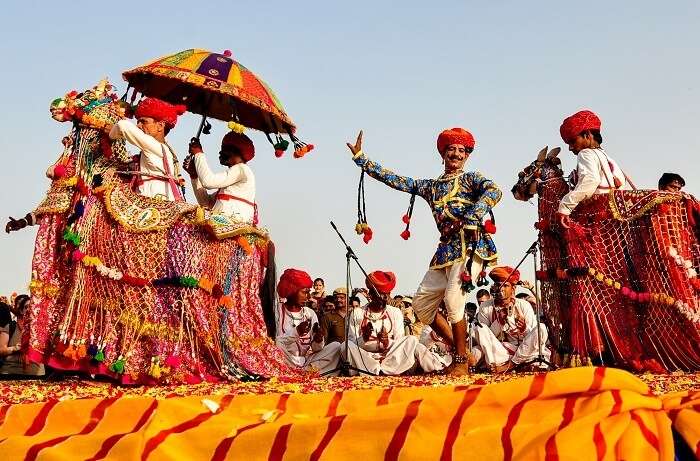Pushkar in Rajasthan is a favored destination of North
India. Hundreds of foreigners throng this place all through the year. The
Pushkar fair is an important occassion when tourists flock Pushkar, however it
is not only at this time of the year when tourism flourishes. Pushkar is the
flavour of every season. Pushkar is a pilgrimage site and is considered one of
the holiest sites in India. The semicircular Pushkar Lake is believed to be
extremely holy and has 52 bathing ghats or steps along its banks. Devotees
bathe in Pushkar Lake and pray at the Temple dedicated to Lord Brahma nearby.
Pushkar is home to the only Brahma Temple in India. The town of Pushkar is far
from the noisy environment of the city. When he reaches the Ghats, particularly
the Ghats near the Sarovar Tourist Bungalow, he gets refreshed and loses his
tiredness of his journey. Pushkar is situated at the foot of the hills which add
to its beauty. Five rivers, Suprabha, Kanaka, Prachi Nanda, and Saraswati flow
here and make the place more beautiful and serene.

The scenic lake of Pushkar is situated in a valley about
10 kms to the northwest of Ajmer. Pushkar Lake is enclosed by hills and desert.
Pushkar Lake is one of the most holy place for Hindus. There are about 52 Ghats
and 400 temples in Pushkar which are situated on the banks of the Pushkar Lake.
It is considered that the famed waters of the Pushkar wash away the sins of
whole life.
Pilgrims from all over come to take bath in the holy
waters of Pushkar on the day of Kartik Purnima or on any of the four days
before the day of Kartik Purnima and also worship at the Ghats. The spiritual
water of the Lake is also considered to treat skin diseases, making Pushkar
"the Lourdes of the East".

The history of Pushkar Lake dates back to 4th century BC.
The creation of Pushkar Lake, as an artificial lake goes back to12th century.
In 1615–16, the Mughal emperor Jahangir set up his hunting lodge on the shores
of the Pushkar Lake. He came to this lodge for hunting when he was staying in
Ajmer, about 20 kilometres from Pushkar. This act breaks the local custom of in
which animals are not to be killed in the areas of the holy lake. Later,
grandson of Jahangir named Aurangzeb (1618–1707) destroyed some of the temples
of the pushkar which were built again afterwards. The Rajput rulers of Amber,
Bundi, Bikaner and Jaisalmer put their maximum efforts to re-establish the
significance of the lake and its nearby temples.
Ghats of the Pushkar Lake are also renovated and also
temples are built around it by various rulers like Maharaja Man Singh I of
Amber, Daulat Rao Scindia, Maha Rana Pratap etc.
The Savitri Temple Pushkar is dedicated to the desolated
wife of Lord Brahma, Savitri. The temple was built in 1687, on the top of the
Ratnagiri Hill behind the Bramha Temple. Both the idols of Savitri and Gayatri
are installed here. The idol of Savitri dated back 7 century A.D and Bangar
family built this temple in early 20th century.

It is believed that goddess rested upon this hill on her
arrival to Pushkar. The temple has its route through hills, and it takes about
an hour to reach the temple. Savitri temple also the best place for enjoying
the scenic beauty and view of the lake and its surrounding picturesque
villages.
Brahma Temple in Pushkar is one of the most famous and
only few of the temples dedicated to Lord Brahma in the holy city of Pushkar,
Rajasthan. This Pushkar Brahma Temple is the place of deep spirituality and
thousand of devotees come here to pay homage to the many gods that reside in
this temple town. Pushkar city has over 500 temples with the main Pushkar
temple. It is dedicated to lord Brahma and the only Brahma temple anywhere in
the world. Although the structures of the temple dates back to 14th century but
it is believed that the temple is about 2000 years old.

The sprawling annual festivities of the 100 year old
Pushkar Mela through its dramatic collage of diversified pictures, mirrors the
vibrancy of the gracious state of Rajasthan. It is celebrated for five days
from the Kartik ekadashi to Kartik Poornima, the full moon day of Kartik
(October–November) in Hindu calendar. The full moon day is the main day and the
day, according to legend, when the Hindu god Brahma sprung up the Pushkar Lake,
thus numerous people swim in its sacred waters. This iconic fair attracts
thousands of livestock and almost a million tourists including many from across
the world.

Images of silver bells making heart pleasing jingles,
animals walking over sparkling sand dunes and beautifully decked up camels with
their owners sitting on their backs has become the most fascinating norm at
this stunning cultural retreat. A huge carnival is held, with an array of
musicians, dancers, acrobats, snake charmers and carousel rides to entertain
the world.
Thus, the grand occasion of the Pushkar Mela is
definitely a priceless treat for those who wish to eye the vibrant culture and
traditions of Rajasthan.
Centrally located in the town, the Panch Kund Shiva
temple is just 2 to 3 kilometers away from the famous Pushkar Lake. If you’re
interested to know more about the stories of Mahabharata, visit this beautiful
Temple which is known to have been built by the Pandavas and is dedicated to
Lord Shiva.

Pushkar has 52 ghats around the lake, each one
constructed for a Rajput Maharaja, who used to worship and pay respect to their
local deities and other Hindu gods. However, two of them are the most notable.
The Gau Ghat is famous because the ashes of Mahatma Gandhi, Jawahar Lal Nehru,
and Lal Bahadur Shastri were scattered into the lake here. The Brahma Ghat is
where it’s believed that Lord Brahma himself worshipped.
Comments
Post a Comment